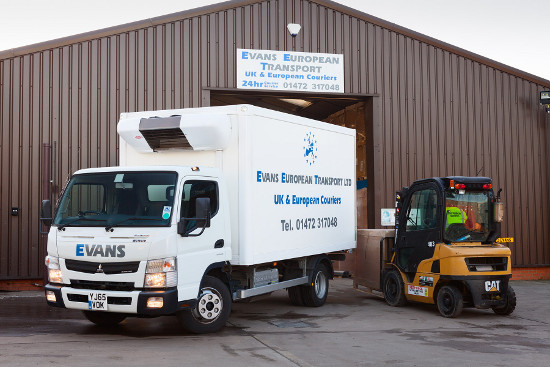Hybrid electric-petrol cars are becoming increasingly common, to the point where they are among the most popular models sold (as with some Toyota cars). Fuel consumption is genuinely increased with no extra operating cost for the owner.
It seems that a similar situation is starting to exist with lorries, at least at the lower end of the weight scale. Temperature-controlled distribution specialist Evans European Transport recently acquired its first diesel-electric FUSO Canter. This was used to replace a conventional diesel truck from another manufacturer doing the same work.

Evans European Transport’s first Fuso Canter Eco Hybrid is delivering significant fuel savings.
The Canter Eco Hybrid is already delivering 17.5mpg, whereas the conventional vehicle only managed 14mpg, according to Evans. That’s a fuel saving of 20%. Returns from the Canter are also likely to improve further as the engine loosens up and is run in.
FUSO trucks are sold by Mercedes-Benz dealers in the UK and are increasingly popular, thanks to their above-average payload and low running costs. The Canter 7C15 Eco Hybrid is powered by a 110 kW (150hp) diesel engine that works in parallel with a state-of-the-art 40 kW (54hp) electric motor.
From stationary it uses electric power only, then switches to a combination of diesel and electric operation once a speed of around 6 mph has been reached. Depending on the power demand, the electric motor also supports the diesel at higher speeds; mode switching is seamless, requiring no input from the driver. To optimise fuel-saving an Idle Start-Stop system is fitted as standard.
The compact, lightweight electric motor and lithium-ion batteries – covered by a 10-year, unlimited mileage warranty, fully supported by FUSO – mean the hybrid version weighs just 160 kg more than the standard diesel-powered Canter, resulting in a 5.0 tonne body and payload allowance.
Given that this technology appears to generate worthwhile savings in both cars and lorries, it shouldn’t be too much of a stretch to make it work in vans.
A spate of trials around 2008/9 suggested that fuel savings of 20-25% could be achieved with corresponding CO2 reductions, but things have gone quiet since then. Hybrid vans remain thin on the ground. None of the major volume manufacturers yet offer one — instead, it’s left to aftermarket converters such as award-winning Ashwoods.
Possible reasons for this are greater upfront cost and question marks over residual values. But I’d have thought that the experience of the car sector would enable big fleet and lease operators to work out good enough answers to these questions. A 10-year warranty on the electric motor and batteries — as with the FUSO Canter — should also ease concerns.
Another possibility of course is that low fuel prices mean manufacturers and operators no longer feel the same urgent need to cut fuel consumption as they did in 2008, when oil prices touched an all-time high of $148 per barrel. Today, the figure is around $31 per barrel and petrol has dipped below a quid for the first time in some years.
We’ll have to see how the market develops, but it’s worth considering that if Evans’ hybrid Canter does 60,000 miles per year (I’m guessing here), then the 3.5mpg difference between the diesel truck’s 14mpg and the Canter’s 17.5mpg equates to a fuel saving of 20%, or 3,820 litres of diesel per year.
The financial and environmental implications are considerable over a 3-5 year operating cycle.

Pingback: Don’t Tevva give up on electric power: UK firm develops new low emission system | Van News: The VanRental.co.uk Blog